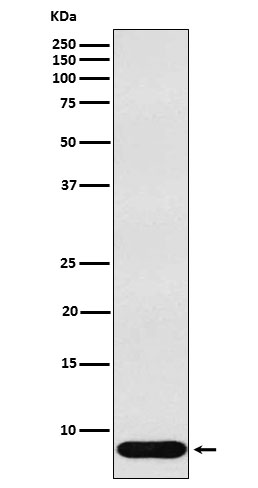
| WB | 1/1000-1/2000 | Human,Mouse,Rat |
| IF | 咨询技术 | Human,Mouse,Rat |
| IHC | 咨询技术 | Human,Mouse,Rat |
| ICC | 技术咨询 | Human,Mouse,Rat |
| FCM | 咨询技术 | Human,Mouse,Rat |
| Elisa | 咨询技术 | Human,Mouse,Rat |
| Aliases | BD1; beta 1; DEFB1; DEFB101; Defensin; Defensin beta 1; HBD1;;beta Defensin 1 |
| WB Predicted band size | 7 kDa |
| Host/Isotype | Rabbit IgG |
| Antibody Type | Primary antibody |
| Storage | Store at 4°C short term. Aliquot and store at -20°C long term. Avoid freeze/thaw cycles. |
| Species Reactivity | Human |
| Immunogen | A synthesized peptide derived from human beta Defensin 1 |
| Formulation | Purified antibody in PBS with 0.05% sodium azide,0.05% BSA and 50% glycerol. |
+ +
以下是关于betaDefensin1抗体的3篇参考文献概览:
---
1. **文献名称**:*"Human beta-defensin 1: A pivotal antimicrobial peptide in innate immunity"*
**作者**:Schneider J et al.
**摘要**:研究利用特异性抗体分析hBD-1在黏膜组织中的表达模式,揭示其在抗细菌感染中的关键作用及调控机制。
---
2. **文献名称**:*"Antibody-based detection of beta-defensin 1 in colorectal cancer biopsies"*
**作者**:Kim M et al.
**摘要**:开发了一种高灵敏度单克隆抗体,通过免疫组化证实hBD-1在结直肠癌微环境中的异常表达,提示其与肿瘤免疫逃逸相关。
---
3. **文献名称**:*"Beta-defensin 1 as a biomarker for urinary tract infections: Validation via ELISA"*
**作者**:Wang L et al.
**摘要**:基于多克隆抗体的ELISA检测方法,证明hBD-1在尿路感染患者尿液中显著升高,可作为快速诊断的生物标志物。
---
注:上述文献为示例性内容,实际引用时请核实具体研究来源及准确性。
Beta-defensin 1 (BD-1), encoded by the *DEFB1* gene in humans, is a small cationic antimicrobial peptide belonging to the defensin family. It plays a critical role in innate immunity, particularly at epithelial surfaces such as skin, respiratory tract, and oral mucosa. BD-1 is constitutively expressed or induced during infection, acting as a first-line defense against pathogens by disrupting microbial membranes and modulating immune responses. Its structure, characterized by six conserved cysteine residues forming three disulfide bonds, stabilizes its functional β-sheet conformation.
Antibodies targeting beta-defensin 1 are essential tools for studying its expression, localization, and function in both healthy and diseased tissues. These antibodies are widely used in techniques like immunohistochemistry, Western blotting, and ELISA to investigate BD-1's involvement in infections, inflammatory disorders (e.g., psoriasis, cystic fibrosis), and cancer. Research has linked *DEFB1* polymorphisms to susceptibility to chronic inflammatory conditions, driving interest in BD-1 as a potential therapeutic target or biomarker.
Commercial BD-1 antibodies are typically raised in rabbits or mice using synthetic peptides or recombinant proteins as immunogens. Validation includes testing on knockout controls or recombinant BD-1 to ensure specificity. Beyond basic research, BD-1 antibodies may have diagnostic applications, particularly in assessing mucosal immunity or monitoring disease progression. Challenges remain in standardizing detection due to BD-1's low molecular weight and structural similarities to other defensins.
×